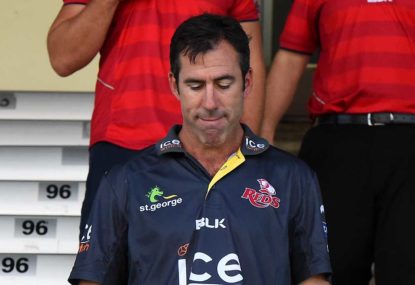My wife recently returned from overseas, where she met the new husband of an old friend. When I asked her what he was like, she replied “Yeah, he’s nice. Harmless.”
I recoiled in horror at the prospect of being described as “harmless”. Could a more benign, vanilla fate befall a man?
Horribly, during the Reds post-match media conference after the torpid loss to the Waratahs, the only word that I could think of watching Richard Graham was ‘harmless’.
The problem with Graham is, he strikes everyone as just being a terrifically nice bloke. And nice blokes make great assistant coaches. But to be a good head coach you have to have an edge, and at times be a bit of a prick. People have to see something compelling in your delivery.
After all, rugby is a passionate game for passionate people, and players have to know that you care about what happens. A bit of danger is not a bad thing.
George Gregan was once pilloried for his comment that “passion was overrated”, because people thought he was saying that passion didn’t matter. What he was actually saying was that passion can’t fill the gap left by poor strategy and skills.
The Reds seem to have all of the above problems – problems with strategy, problems with skills and problems with passion – so the question becomes which to fix first?
A bad plan executed passionately is still a bad plan, so clearly the strategy needs work. A flyhalf wouldn’t hurt either.
There is room for passion in the delivery of the message from the coach. Now, we don’t see what happens behind closed doors, so for all we know, Graham may be a regular Patton in the changeroom. But his performance in the post-Waratahs press conference looked like a guy who was trying to analyse his way out of trouble. He identified several problem areas, discussed Nick Frisby’s performance at flyhalf, lamented handling errors.
Everything he said was tactically and strategically on the money. But it sounded like an accountant on a tea break nutting out a particularly tough sudoku problem. He just didn’t look like a man who cared that much.
The delivery of the message is all-important in coaching. Graham looks awfully like Robbie Deans, another terrific bloke and smart coach who clearly knew what it was all about, but struggled to engage the people. And engagement is where it’s at.
If you’ve seen Moneyball, you’ll remember the scene where the losing Oakland A’s baseball team are partying in the losing dressing room.
Billy Beane walks in the door, carefully selects a bat and in one hit, smashes the stereo to pieces. In the awkward silence that follows, Beane asks the players “Is losing fun?” No answer.
“Is losing fun?” A sullen “no”.
Beane: “Well what are you having fun for?” No answer.
Beane points a finger at the ceiling. “Hear that?” Deafening silence. “That… is what losing sounds like.”
Great cinema, and of course, smashing the stereo and the Gatorade cooler doesn’t motivate people in itself. But when it is rooted in genuine feeling it shows them what side you’re on. More importantly, it forces them to choose a side too. Are you with me, or agin me?
When Billy Beane left the room, having made it clear how much he hated losing, there were two types of people left behind: those who realised they needed to take some ownership and knuckle down to solve the problem, and those who thought he had overreacted.
The second group were gone shortly after.
Showing the things we care about gives a team a trademark. In Super Rugby, team trademarks are emerging all the time.
The Rebels’ trademark hard-edged, hassling defence, the Chiefs’ mobile offload game, the Stormers’ scrum, the Brumbies’ width. The trademark gives a team an identity – something to protect, something to aspire to and something to enjoy when it goes right.
The Reds, who once owned the global trademark on running rugby, now have no brand at all. They have no idea about what is important in their game – no one has forced them to choose a side, and so they’re all just doing their best as individuals.
If the trademark of a team is born of its heritage, then the keeper of the flame is the coach. The coach demands perfection on the trademark, calls the players on the things that don’t contribute to that perfection, strives for excellence and shows his pleasure and displeasure.
A good coach can’t be beige, it’s too confusing for the players. They have to know what is most important here? And to work out what is important, they watch, listen and observe. If it’s beige, they’re bored.
Note that showing what you care about doesn’t have to equal a rant at high volume. Think Wayne Bennett or Jack Gibson – low volume, but candid, forthright and leaving no one in any doubt about where they stand.
Very few people would ever describe Graham Henry, Steve Hansen, Michael Cheika, Clive Woodward or Jake White as harmless.
Unfortunately for the Reds, it’s a description that sits a little too comfortably on Richard Graham.





























































































